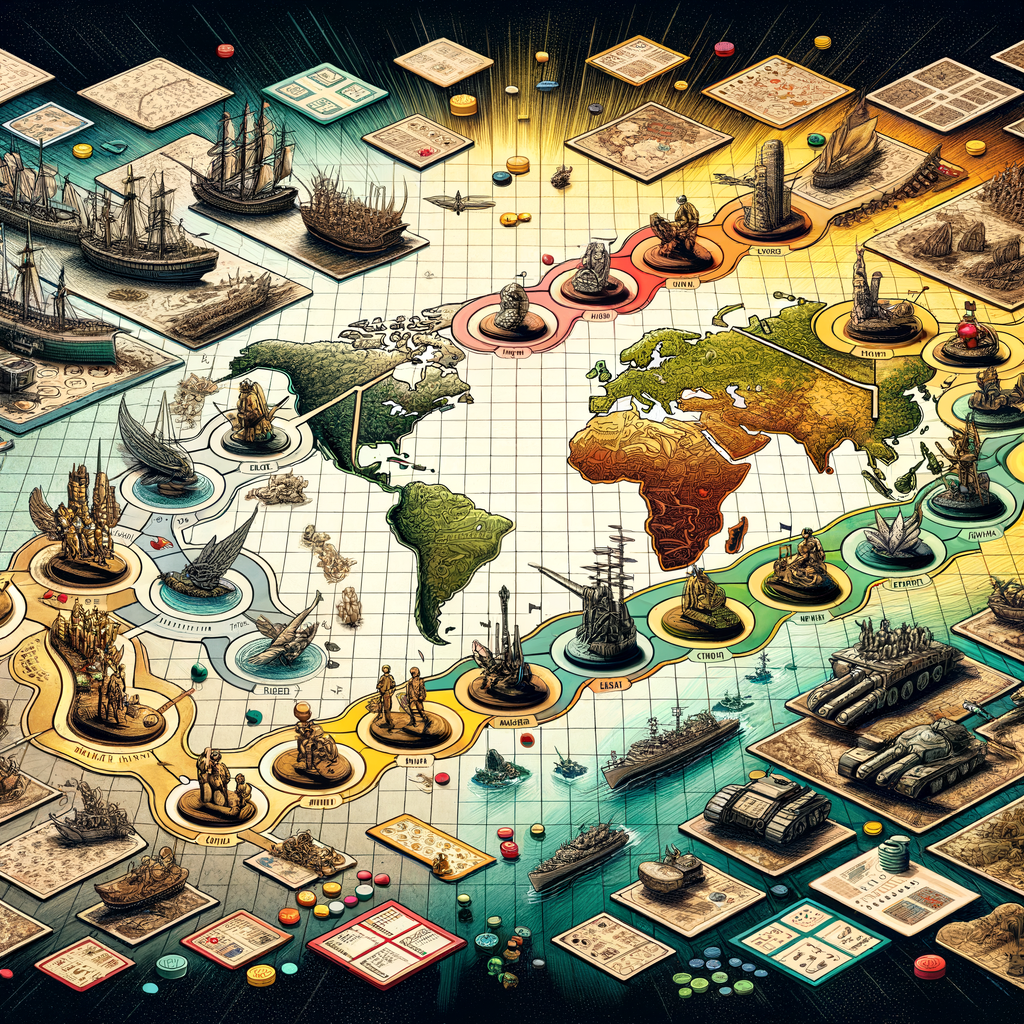Introduction: The Evolution of Board Games
Board games have been a part of human culture for thousands of years, serving as a source of entertainment and learning. The journey from ancient games to the complex strategy games we enjoy today is a fascinating tale of innovation, creativity, and the human spirit. Let’s delve into this exciting world and explore the evolution of board games.
- Overview of the history of board games
The history of board games dates back to around 3500 BC with the discovery of ‘Senet’, an ancient Egyptian game. Over the centuries, board games have evolved, reflecting changes in society, technology, and culture. In the 20th century, board games like ‘Monopoly’ and ‘Clue’ became household names, paving the way for the modern era of board gaming. Today, we have a plethora of board games, ranging from simple roll-and-move games to intricate strategy games. To learn more about the history of board games, you can visit Wikipedia.
- The role of strategy in board games
Strategy plays a crucial role in board games. It’s the mental challenge, the thrill of outsmarting your opponent, that makes these games so engaging. Strategy board games require players to make decisions that will affect the outcome of the game. They involve planning, tactical maneuvering, and a deep understanding of the game’s mechanics. Games like ‘Chess’ and ‘Risk’ are perfect examples of strategy board games that require critical thinking and planning. The rise of strategy in board games has not only made them more engaging but also turned them into valuable educational tools.
In the following sections, we will delve deeper into the birth of strategy board games, the rise of complex war games, and the tactics used in these games. We will also look at what the future holds for strategy board games. So, stay tuned!
The Birth of Strategy Board Games: Risk Board Game
Let’s delve into the fascinating world of strategy board games, focusing on one of the pioneers in the field, the Risk board game.
History of the Risk board game
The Risk board game was born in the mind of French film director Albert Lamorisse in 1957. Originally named “La Conquête du Monde” (The Conquest of the World), it was later published by Parker Brothers in 1959 and renamed “Risk”. The game quickly gained popularity due to its unique blend of strategy, negotiation, and luck. It was one of the first games to offer non-linear movement – a revolutionary concept at the time. For more details, you can visit the Wikipedia page.
Key strategies and tactics in Risk
Risk is a game of strategic conquest. Players must balance the need for expansion with the need for defense. Here are a few key strategies:
- Fortification: Building a strong defense is as important as planning an attack. Players should aim to fortify their borders and build up their armies before launching an offensive.
- Continent Control: Controlling an entire continent provides bonus armies each turn, making it a worthwhile strategy.
- Player Alliances: Forming temporary alliances can be beneficial. However, players must remember that only one can win in the end.
These strategies, among others, make Risk a game where every decision counts. It’s not just about the roll of the dice, but also about how you play the game.
Case Study: The Impact of Risk on Board Gaming Evolution
Let’s delve into a fascinating case study that explores how the game of Risk revolutionized the world of board games and influenced the creation of many others.
How Risk changed the landscape of board games
The game of Risk, first published in 1959, brought a new dimension to board games. Before Risk, most board games were based on luck, with players’ moves determined by dice rolls or card draws. Risk introduced the concept of strategy, where players had to make decisions about where to place their armies, when to attack, and how to form alliances. This added depth and complexity to the game, making it more engaging and challenging.
Risk also introduced the concept of world domination, where the goal is to conquer all territories on the board. This was a significant departure from traditional board games, which usually had more straightforward objectives, like reaching a specific location or accumulating the most points. The idea of world domination added a new level of excitement and competition to board games.
Examples of games influenced by Risk
Many modern board games have been influenced by Risk. Here are a few notable examples:
- Axis and Allies: This game takes the world domination concept of Risk to another level, adding economic factors and specific country roles. The influence of Risk is evident in the game’s strategic depth and complexity. Learn more about Axis and Allies.
- Diplomacy: Like Risk, Diplomacy involves strategic planning and alliance formation. However, it eliminates the element of chance, making every game outcome entirely dependent on players’ decisions. Learn more about Diplomacy.
- Small World: This game combines Risk’s territory control mechanics with fantasy elements, creating a unique and engaging gameplay experience. Learn more about Small World.
In conclusion, Risk has had a profound impact on the evolution of board games. Its innovative gameplay mechanics and strategic depth have inspired countless other games, contributing to the rich diversity and complexity of today’s board game landscape.
The Rise of Complex War Games
In the world of board games, there is a special category that stands out for its depth and complexity. These are the war games. Let’s explore this fascinating genre.
- Introduction to complex war board games
War board games, unlike traditional board games, are not just about rolling dice and moving pieces around a board. They are about strategy, tactics, and careful planning. They require players to think several moves ahead, anticipate their opponents’ actions, and adapt their strategies on the fly. These games often recreate historical battles or hypothetical scenarios, allowing players to step into the shoes of generals and commanders.
- How war games elevated board game strategy
War games have taken board game strategy to a whole new level. In traditional board games, the strategy is often straightforward and the outcome heavily depends on luck. In war games, however, luck plays a minimal role. Instead, the outcome is determined by the players’ strategic decisions, their ability to adapt to changing circumstances, and their understanding of the game’s mechanics. This has elevated the strategic depth and complexity of board games, making them more engaging and challenging.
These games, with their intricate rules and deep strategic elements, have captivated the minds of players around the world. They have transformed the landscape of board gaming, pushing the boundaries of what is possible in this format. So, if you’re ready for a challenge and want to test your strategic skills, give war games a try. You might just find your new favorite pastime.
Strategy in War Games: A Deep Dive
War games have always been a fascinating arena for strategy enthusiasts. The complexity and depth of these games demand a high level of strategic thinking. Let’s dive deep into the key elements of strategy in war games and explore some examples of strategic decisions.
Key Elements of Strategy in War Games
There are several key elements that define strategy in war games. Let’s explore them:
- Planning: This involves setting goals and determining the best way to achieve them. In war games, this could mean planning your moves several turns ahead.
- Resource Management: This involves making the most of the resources available to you. In a war game, this could mean managing your troops, resources, or territories effectively.
- Adaptability: This involves being able to change your strategy based on the situation. In a war game, this could mean adjusting your strategy when an opponent makes an unexpected move.
- Decision Making: This involves making decisions that will affect the outcome of the game. In a war game, this could mean deciding whether to attack, defend, or retreat.Examples of Strategic Decisions in War Games
Now, let’s look at some examples of strategic decisions in war games:
- Risk: In the classic war game Risk, a strategic decision could be choosing to focus on controlling a particular continent for its bonus troops.
- Axis & Allies: In this World War II-themed game, a strategic decision could be deciding to invest in technology to gain an advantage over your opponents.
- Star Wars: Rebellion: In this game, a strategic decision could be choosing to focus on military might or diplomatic influence to sway the galaxy to your side.
Understanding the key elements of strategy and being able to make strategic decisions are crucial to success in war games. Whether you’re a seasoned veteran or a newbie, honing these skills can greatly enhance your gaming experience.
Board Game Tactics: From Basic to Advanced
Board games are not just about luck; they also require a good understanding of tactics. Let’s explore some basic and advanced tactics used in board games.
- Understanding basic board game tactics
Basic board game tactics are the foundation of any game strategy. These are simple yet effective methods that can help you gain an advantage over your opponents. A basic tactic could be as simple as blocking your opponent’s path in a game like Checkers or strategically placing your pieces in a game like Chess.
For example, in the game of Chess, a basic tactic is the “fork”. This is when a single piece threatens two or more of the opponent’s pieces at the same time. This forces the opponent to make a difficult decision, often leading to a loss of material.
- Advanced tactics in modern board games
As board games have evolved, so have the tactics used by players. Modern board games often involve complex strategies that require a deep understanding of the game’s mechanics and a keen sense of anticipation.
In the popular board game Settlers of Catan, an advanced tactic involves strategically placing your settlements and roads to control the most resource-rich areas of the game board. This not only provides you with more resources but also limits the resources available to your opponents.
In the game Ticket to Ride, an advanced tactic might involve holding onto your train cards until you can claim a long route, earning you more points and potentially blocking your opponents’ routes.
Understanding and mastering these tactics can greatly increase your chances of winning, whether you’re playing a classic board game or a modern one.
Key Takeaways: Applying Board Game Strategies in Real Life
Lessons learned from board game strategies
Board games, especially strategy games, teach us a lot about planning, decision-making, and problem-solving. These are skills that we can apply in various aspects of our lives. For instance, in games like Risk, players must make strategic decisions about where to place their armies and when to attack. This teaches us the importance of strategic planning and risk assessment, skills that are crucial in many real-life situations such as business planning and investment decisions.
Moreover, board games often require players to adapt their strategies based on the actions of other players. This teaches us the importance of flexibility and adaptability, skills that are essential in our fast-paced, ever-changing world.
How board game tactics can be applied in real-life situations
Board game strategies can be applied in real-life situations in numerous ways. For example, the negotiation skills learned in games like Monopoly can be used in business dealings or even in everyday interactions. Similarly, the resource management skills learned in games like Settlers of Catan can be applied to personal finance or project management.
Furthermore, many board games require players to anticipate the actions of their opponents and plan their moves accordingly. This ability to think ahead and plan strategically is a valuable skill in many real-life situations, from planning a career path to making important personal decisions.
In conclusion, board games are not just a source of entertainment. They are a valuable tool for learning and developing important life skills. So the next time you play a board game, remember that you’re not just having fun – you’re also honing skills that can help you succeed in real life.
Conclusion: The Future of Strategy Board Games
As we’ve journeyed through the history of strategy board games, we’ve seen how they’ve evolved from simple games of chance to complex simulations of warfare and economic systems. But what does the future hold for these beloved pastimes? Let’s explore some predictions and discuss the ongoing importance of strategy in board games.
- Predictions for the evolution of board games
Board games have always mirrored societal trends and technological advancements. With the rise of digital technology, we can expect to see more hybrid games that combine physical components with digital elements. For instance, Monopoly has already introduced a version that uses credit cards instead of paper money. Furthermore, we might see more games that incorporate virtual or augmented reality, offering immersive experiences that were previously unimaginable.
However, the core appeal of board games – the tactile pleasure of moving pieces around a board, the face-to-face interaction with other players – is unlikely to change. As such, traditional board games will continue to thrive alongside their high-tech counterparts.
- The ongoing importance of strategy in board games
Strategy is the heart and soul of board games. It’s what sets them apart from games of pure chance, and it’s what keeps players coming back for more. The thrill of outwitting an opponent, the satisfaction of seeing a plan come together – these are experiences that only strategy games can provide.
As board games continue to evolve, we can expect strategy to remain a key component. Whether it’s a classic game like Risk or a modern masterpiece like Catan, the ability to formulate and execute a winning strategy will always be a crucial part of the game.
In conclusion, the future of strategy board games is bright. They will continue to evolve and adapt to new technologies, but their core appeal – the challenge of strategic thinking, the joy of social interaction – will remain timeless. So whether you’re a seasoned gamer or a newcomer to the hobby, there’s never been a better time to dive into the world of strategy board games.




